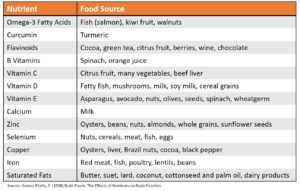Brain Food

Our brain is a complex organ structured from protein, fats and other molecules. To work efficiently, it needs a constant supply of the molecules that make up its cells together with a a good source of energy. For the brain to function properly, some of the molecules can be produced in the body from components of the food we eat, but others have to come specifically from the food as they can’t be made by the body.
Therefore we need to ensure our diet includes all that the brain needs, and reduce the molecules which can actually prevent the brain from working properly. A balanced diet is therefore essential.
According to research, both under-eating and over-eating can be bad for the brain. When we learn new information, our brain creates new connections. When there is either too little or too much nutrition, the number of new connections that are made decreases, and therefore so does our learning and memory.
As part of our digestive system, signals from the stomach to the hypothalamus and back, confirm when we’re eating and when we’re full. The hypothalamus also sends a signal to the limbic system which creates the pleasurable feeling we get from food, which in turn increases the function of the immune system and reduces stress.
So much happening from the food we eat! However, if you eat too much of all foods, or too much of the wrong foods, all these systems can be thrown out of balance.
WHAT FOODS DO WE NEED TO KEEP TO A MINIMUM?
We need some, but too much Saturated Fats are bad for your brain, as it has been shown to reduce learning and memory.
WHAT FOODS SHOULD WE EAT?
The foods that are good for your brain are called functional foods. The first discovered were Omega-3 and Omega-6 fatty acids. We cannot make these in our bodies, but they are essential to make the cell membranes that surround the neurones in the brain. Research suggests that these increase new connections in the brain, but also improve mood and decreases incidences of depression.
Eating foods that are not good for us can cause a build up of free radicals in our neurones, which can lead to inflammation of the cells and eventually cell death. Our brains have some capacity to eliminate free radicals, but then we need foods containing anti-oxidants (including flavoids) to help reduce inflammation and to repair damaged cells.
Vitamins B, C, D and E and elements such as calcium, zinc, selenium, copper and iron have all been shown to improve learning and memory in research studies. Curcumin has also been shown to protect against Alzheimer’s disease.

An important finding from recent research is that all the effects of the function foods are significantly increased when people exercise in addition to eating healthily.
WHAT SHOULD WE DRINK?
As part of a well balanced diet, the fluid we intake is also important. Dehydration of as little as 2% can reduce your brain function, but so can drinking too much. Fortunately, we are well equipped to know when we need to drink – we feel thirsty!
Although there has been no scientific evidence that 8 glasses of water is what we need, your thirst is the best mechanism for telling you the amount of fluid to have. And the fluids you intake do not have to be water. Much of our food is water based and this counts, so does coffee (in moderation), tea, juices and even beer and wine (again, in moderation).
Source: Patricia Riddell, Applied Neuroscience
